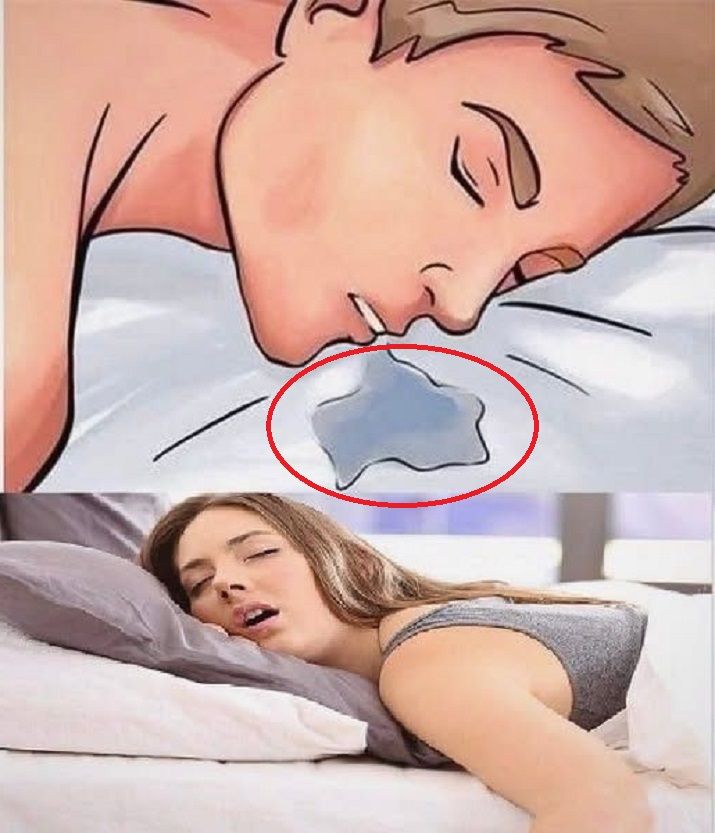Waking up to a wet pillow is more common than most people think. Drooling during sleep is a natural bodily function that affects nearly everyone at some point, and in most cases, it’s harmless. Still, it can be awkward or embarrassing, especially if it happens while staying at a friend’s home, on a plane, or worse, on your in-law’s pristine couch. While usually nothing to worry about, persistent or excessive drooling can sometimes signal underlying health issues worth exploring with a doctor.
One of the simplest reasons for drooling is sleep position. When you rest, your facial and jaw muscles relax, and if you lie on your stomach or side, gravity encourages saliva to escape from the corners of your mouth. Nasal congestion can make the problem worse. Blocked airways force you to breathe through your mouth, often leading to more drool. Many people notice drooling spikes during colds or allergy flare-ups, but the issue often disappears once normal breathing resumes.
Medications are another common culprit. Certain drugs, including sedatives, antipsychotics, antibiotics, and even over-the-counter NSAIDs like ibuprofen, can increase saliva production. While this doesn’t mean you should stop taking prescribed medications, your doctor can offer guidance, adjust doses, or suggest alternatives to help reduce drooling if it becomes bothersome.
Nasal issues, such as sinus infections, seasonal allergies, or simple colds, also contribute to nighttime drooling. When your nose is blocked, your instinct is to sleep with your mouth open. As a result, saliva naturally escapes more easily. Most of the time, the drooling resolves once the congestion clears up, though frequent or chronic issues may require medical attention.
A deviated septum is a structural nasal problem that can consistently restrict airflow, forcing mouth breathing. Over time, this increases the likelihood of drooling while sleeping. In severe cases, surgery might be recommended, but the first step is usually a consultation with an ear, nose, and throat specialist to evaluate options and determine the best course of action.
Sleep apnea is another serious condition linked to drooling. This disorder involves repeated pauses in breathing during sleep, often accompanied by loud snoring or choking sounds. Increased mouth breathing is a natural consequence, leading to excess saliva escaping at night. Sleep apnea has broader health consequences, including chronic fatigue, cardiovascular risks, and disrupted sleep for both the patient and their partner. Early diagnosis and treatment are essential.
Dental and oral health can also affect nighttime drooling. Cavities, gum infections, or other dental issues stimulate saliva production. If drooling occurs alongside pain, swelling, or difficulty chewing, a visit to the dentist is important. Proper treatment can eliminate both the source of the discomfort and the excessive saliva.
Gastroesophageal reflux disease (GERD) can also contribute to nighttime drooling. Acid reflux may make swallowing difficult, increasing saliva production and leading to drooling. Individuals experiencing frequent reflux and excess saliva should discuss options with their doctor, which might include dietary changes, lifestyle adjustments, or medications.
Neurological conditions are less common but more serious causes of drooling. Disorders like Parkinson’s disease, Alzheimer’s, ALS, stroke, or cerebral palsy can affect the body’s ability to manage saliva effectively. Even deficiencies in nutrients such as vitamin B12 can play a role. When drooling appears suddenly, worsens, or occurs alongside other neurological symptoms, seeking professional evaluation is crucial.
Certain lifestyle factors, such as teeth grinding or bruxism, can worsen drooling. Mouthguards or mandibular devices designed to prevent tooth damage sometimes keep the mouth slightly open, unintentionally promoting drooling. Adjustments by a dentist can help balance protection with comfort and reduce excess saliva during sleep.
Finally, pregnancy can increase saliva production, a condition known as ptyalism gravidarum. Hormonal changes, stress, and swollen salivary glands contribute to this phenomenon. Though typically temporary, it can persist through different stages of pregnancy and usually resolves after childbirth.
Adjusting Sleep Habits – Sleeping on your back can help minimize drooling by allowing gravity to keep saliva inside the mouth. Training yourself to maintain this position may take time but can be highly effective.
Home Remedies and Hydration – Simple strategies such as chewing lemon wedges, sipping water, or staying well-hydrated can thin saliva and reduce drooling. However, overuse of acidic foods like citrus can damage tooth enamel.
Oral Devices and Adjustments – For those using mouthguards or mandibular devices, consulting with a dentist for proper fitting can prevent excess drooling while maintaining dental protection.
Addressing Sleep Apnea – Using CPAP machines for diagnosed sleep apnea patients not only improves breathing but can also reduce nighttime drooling. Compliance with therapy is key to seeing benefits.
Botox Treatments for Severe Cases – In rare situations, doctors may inject Botox into salivary glands to reduce saliva production. This is temporary and requires repeat treatments but can provide relief for those with persistent issues.
Surgical Options – Surgery to remove or reposition salivary glands is a last resort, generally reserved for neurological causes or extreme cases of drooling that do not respond to other treatments.
Medical Consultation for Sudden Changes – If drooling suddenly worsens, interferes with sleep, or is accompanied by pain, difficulty swallowing, or speech changes, it’s important to see a doctor. Early intervention can identify underlying health issues.
Monitoring Oral Health – Regular dental check-ups can prevent infections or other oral problems that may contribute to excessive saliva production. Maintaining oral hygiene is a simple, effective preventive measure.
Diet and Lifestyle Adjustments – Avoiding foods that trigger reflux, staying upright after meals, and managing allergies can all help reduce nighttime drooling. Small lifestyle changes often make a noticeable difference.
Awareness and Patience – Finally, understanding that occasional drooling is normal can reduce embarrassment. By monitoring patterns, seeking advice when necessary, and making practical adjustments, individuals can minimize drooling and maintain better sleep and overall health.
